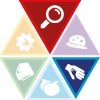Inspector

Inspectors should be great at:
- Estimating sizes, distances, and quantities; or determining time, costs, resources, or materials needed to perform a work activity.
- Observing, receiving, and otherwise obtaining information from all relevant sources.
- Identifying information by categorizing, estimating, recognizing differences or similarities, and detecting changes in circumstances or events.
- Inspecting equipment, structures, or materials to identify the cause of errors or other problems or defects.
Analyzer

Analyzers will often perform the following tasks:
- Identifying the underlying principles, reasons, or facts of information by breaking down information or data into separate parts.
- Using relevant information and individual judgment to determine whether events or processes comply with laws, regulations, or standards.
- Assessing the value, importance, or quality of things or people.
- Compiling, coding, categorizing, calculating, tabulating, auditing, or verifying information or data.
Other work activities related to Neuropsychologists and clinical neuropsychologists
- Writing or preparing detailed clinical neuropsychological reports, using data from psychological or neuropsychological tests, self reporting measures, rating scales, directing observations, or interviews.
- Providing psychotherapy, behavior therapy, or other counseling interventions to patients with neurological disorders.
- Providing education or counseling to individuals and families.
- Participating in educational programs, in service training, or workshops to remain current in methods and techniques.
- Reading current literature, talk with colleagues, and participating in professional organizations or conferences for keeping abreast of developments in neuropsychology.
- Interviewing patients for obtaining comprehensive medical histories.
- Educating and supervising practicum students, psychology interns, or hospital staff.
- Diagnosing and treating conditions such as chemical dependency, alcohol dependency, Acquired Immune Deficiency Syndrome (AIDS) dementia, and environmental toxin exposure.







